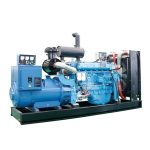Introduction
In today's fast-paced world, the need for reliable power sources cannot be understated. Whether it's for backup power during emergencies, off-grid locations, or remote industrial sites, diesel generators have been a go-to solution for many years. Diesel generators are known for their robustness, efficiency, and reliability, making them a popular choice for various applications. In 300kw diesel generator for remote monitoring stations , we will delve into the reliability standards associated with diesel generators and how they play a crucial role in ensuring uninterrupted power supply.
Overview of Diesel Generators
Diesel generators are a type of internal combustion engine that converts diesel fuel into electrical energy. They consist of a diesel engine coupled with an electric generator that produces electricity. Diesel generators are available in a wide range of sizes, from portable units suitable for small residential use to large industrial generators capable of powering entire facilities.
One of the key advantages of diesel generators is their efficiency and reliability. Diesel fuel is a dense and energy-rich fuel source, which allows diesel generators to produce more power compared to gasoline generators of the same size. Additionally, diesel engines are known for their durability and longevity, making diesel generators a cost-effective choice in the long run.
Reliability Standards for Diesel Generators
Reliability is a critical factor when it comes to diesel generators, especially in applications where a constant and uninterrupted power supply is essential. Various standards and guidelines have been established to ensure the reliability of diesel generators. These standards encompass design, manufacturing, installation, operation, and maintenance aspects of diesel generators to ensure they perform optimally when needed.
1. Design Standards
The design of a diesel generator plays a crucial role in determining its reliability. Design standards specify the requirements that a generator must meet in terms of performance, efficiency, safety, and environmental impact. These standards are set by regulatory bodies and organizations such as the International Electrotechnical Commission (IEC), the American National Standards Institute (ANSI), and the Institute of Electrical and Electronics Engineers (IEEE).

Design standards for diesel generators cover various aspects such as:
- Engine performance: The engine should be capable of delivering the rated power output consistently under various load conditions.
- Fuel efficiency: The generator should be designed to maximize fuel efficiency while maintaining optimal performance.
- Emissions control: Diesel generators must comply with emissions regulations to minimize their impact on the environment.
- Cooling system: Proper cooling is essential to prevent overheating and ensure the longevity of the generator.
- Voltage regulation: The generator should be able to maintain a stable voltage output to protect connected equipment.
- Noise levels: Noise emissions from the generator should be within acceptable limits to minimize disturbance to the surrounding environment.
2. Manufacturing Standards
Manufacturing standards govern the production process of diesel generators to ensure that each unit meets the specified design requirements. Manufacturers must adhere to these standards to guarantee the quality and reliability of their products. Common manufacturing standards for diesel generators include:
- ISO 8528: This standard defines the requirements for the design, testing, and performance of generator sets.
- ISO 3046: Specifies the measurement methods for engine power ratings, fuel consumption, and emissions.
- Quality control standards: Manufacturers must implement quality control measures to ensure that each component of the generator meets the required specifications.
By following manufacturing standards, manufacturers can produce diesel generators that are reliable, efficient, and durable, meeting the needs of customers across various industries.
3. Installation Standards
Proper installation is crucial to the reliable operation of a diesel generator. Installation standards provide guidelines for the correct placement, connection, and setup of the generator to ensure optimal performance. Key aspects covered by installation standards include:
- Location: The generator should be installed in a well-ventilated area with adequate clearance for maintenance and cooling.
- Electrical connections: Proper wiring and grounding are essential to prevent electrical faults and ensure safety.
- Fuel system: The fuel supply should be properly connected and secured to prevent leaks and contamination.
- Exhaust system: The exhaust system must be designed to safely remove combustion gases and minimize noise levels.
- Ventilation: Sufficient ventilation is necessary to prevent overheating and ensure the proper operation of the generator.
Compliance with installation standards helps to avoid common issues such as overheating, electrical faults, and fuel leaks, which can compromise the reliability of the diesel generator.
4. Operation and Maintenance Standards
Once a diesel generator is installed, it is essential to follow operation and maintenance standards to ensure its continued reliability. Proper operation and regular maintenance are key factors in maximizing the lifespan and performance of the generator. Operation and maintenance standards cover the following aspects:
- Start-up and shutdown procedures: Correct starting and stopping procedures help to prevent damage to the engine and generator components.
- Load management: The generator should be operated at optimal loads to maximize fuel efficiency and reduce wear and tear.
- Regular maintenance: Scheduled maintenance tasks such as oil changes, filter replacements, and inspections should be performed to keep the generator in peak condition.
- Troubleshooting and repairs: In the event of a malfunction, operators should be able to diagnose and rectify issues promptly to minimize downtime.
Adhering to operation and maintenance standards ensures that the diesel generator remains reliable and ready to provide power when needed.
Conclusion
Diesel generators play a vital role in ensuring a reliable power supply in various applications, from residential backup power to critical infrastructure. By adhering to reliability standards throughout the design, manufacturing, installation, operation, and maintenance phases, diesel generators can deliver consistent performance and longevity. It is essential for manufacturers, operators, and maintenance personnel to be familiar with these standards and guidelines to uphold the reliability of diesel generators and meet the power needs of modern society.
